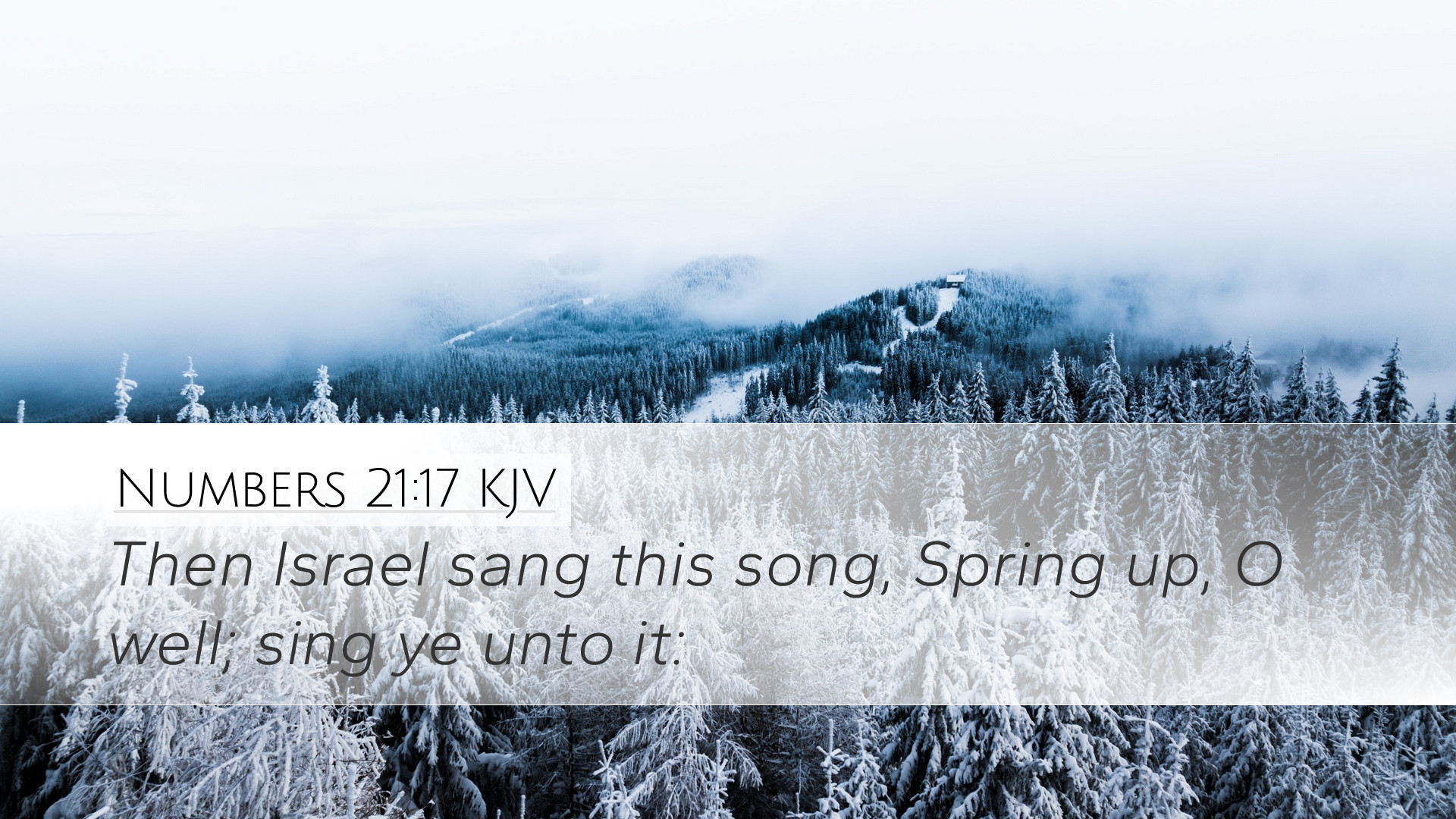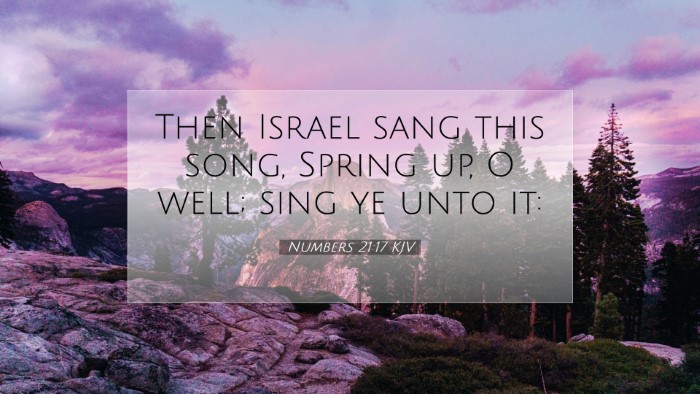Commentary on Numbers 21:17
Bible Verse: "Then Israel sang this song: 'Spring up, O well! Sing to it!'" (Numbers 21:17, ESV)
Introduction
The passage of Numbers 21:17 marks a significant moment in the journey of the Israelites in the wilderness. Here, they express joy and gratitude as they discover a source of water, which symbolizes life and sustenance amidst their hardships. This commentary draws upon the insights of renowned biblical scholars such as Matthew Henry, Albert Barnes, and Adam Clarke, providing an in-depth exploration of the spiritual and theological implications of this verse.
The Context of Numbers 21:17
In the broader narrative of the book of Numbers, the Israelites have been wandering in the desert for numerous years. Their journey is fraught with trials as they navigate through various challenges, including battles with opposing nations and internal discontent. This particular verse occurs after a significant event where Israel has defeated the Canaanite king of Arad, which sets a tone of victory and celebration.
1. Connection to the Previous Events
According to Matthew Henry, the song of Israel is not only an expression of gratitude for physical sustenance but also a spiritual response to God's provision. The Israelites had recently faced physical scarcity, leading to complaints and despair. Yet, His miraculous provision of water serves as a reminder of God's faithfulness during their trials.
2. The Significance of Water in Scripture
Both Albert Barnes and Adam Clarke highlight the thematic significance of water throughout the Bible. Water is often depicted as a symbol of spiritual refreshment and life. In ancient Israel, wells were not merely sources of hydration but also places of community and worship. This verse captures the joy associated with discovering a well, which can be seen as a prefigurement of Christ—the living water (John 4:10).
The Thematic Elements of the Song
The song "Spring up, O well!" reflects a response to divine intervention. The phrase emphasizes the action of "springing up," suggesting an eruption of joy and celebration among the people. Here, we can dissect several key thematic elements:
- Gratitude: The Israelites' song is a direct expression of thankfulness to God for His provision. Matthew Henry emphasizes that remembrance of God's blessings should compel believers to vocalize their gratitude.
- Joy: The exuberance in this song showcases an overflowing joy stemming from the refreshing waters provided by God. This aligns with Adam Clarke's assertion that joy is a crucial aspect of worship, creating a celebration of hope amid trials.
- Community: The collective singing of this song reflects communal identity and unity, as the entire nation celebrated together. Barnes notes the importance of communal worship in strengthening the people's bond with God and each other.
Spiritual Interpretations
The spiritual interpretation of this verse further deepens its meaning for contemporary readers. The well represents Christ and the salvation He offers:
1. Christ as the Fountain of Living Water
According to John 7:37-39, Jesus refers to Himself as the source of living water that quenches spiritual thirst. Just as the Israelites sang for joy upon discovering the well, believers today can rejoice in the life-giving salvation found in Christ. This connection invites one to reflect on the deeper thirst of the soul that only Christ can satisfy. Adam Clarke articulates this connection expertly, suggesting that the song anticipates the joy and relief found in the coming Messiah.
2. The Importance of Worship
The act of singing is central to worship. The song in Numbers 21 serves as a model for how believers can express their thankfulness and joy in God's provision. Henry points out that songs of praise are vital in remembering God's past deeds, encouraging spiritual resilience among congregants.
Practical Applications for Today
In a contemporary context, the reflections on Numbers 21:17 can be transformative for personal devotion, congregational worship, and theological reflection.
1. Cultivating a Heart of Gratitude
Pastors and leaders can use this passage to encourage congregants to cultivate a lifestyle of gratitude. Regular expressions of thankfulness can foster a supportive community that acknowledges God's daily provisions.
2. Emphasizing Collective Worship
Church services should reflect the communal joy of worship that Israel experienced. Incorporating songs and participatory worship can enhance the sense of community and shared faith among congregation members.
3. Teaching about the Living Water
Educators can draw connections between the well in Numbers and Christ as the source of living water, helping congregants understand the biblical narrative's richness and continuity. This provides a framework for evangelism, speaking to the deeper needs and thirsts of individuals.
Conclusion
Numbers 21:17 is more than a declaration of joy for physical sustenance; it serves as a profound reminder of God's faithfulness and provision amidst trials. Drawing insights from historical commentaries emphasizes the significance of community worship, the thematic elements of joy and gratitude, and the enduring relevance of spiritual thirst addressed by the living water found in Christ. As pastors, students, and theologians reflect on this verse, it calls for heartfelt worship, a celebration of God's goodness, and a deeper understanding of Christ's role in fulfilling the spiritual longings of humanity.


